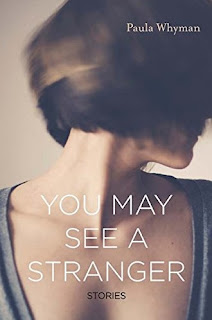I looked up Paula Whyman's collection of linked short stories, You May See a Stranger, because she was featured in a Poets & Writers magazine article, "5 Over 50." These short sketches introduce five authors older than fifty who published their first book in the past year. The implied message: You're not too old to be published. That's good news for some of us.
While the book was published in 2016, it appears the individual stories were written and published over a period of time. Eight of the ten were originally published in eight different literary magazines, but there is no indication of when. Some of us would like to know, although it would not change the pleasure that You May See a Stranger offers.
And the book does offer a variety of pleasures. All of the stories have the same protagonist, Miranda Weber, and they cover incidents in Miranda's life from adolescence to middle age. Miranda tells her own story in eight of the ten stories (the other two are told in the third person), and she is funny, sometimes self-destructive, and human, all too human.
Another pleasure is Whyman's use of language and ability to convey information. Here is the third paragraph of the title story:
"Pogo has wads of cash in his pockets. I have a small square of paper in my purse. It's proof of something that I don't quite believe. When the doctor said it, I thought of an incubator and chicks, my body as a holding area, warm, but like everything else, temporary. Pogo will eventually show everyone the case. I don't plan to show anyone the paper. This is Pogo's big night, no mine. One big night at a time seems like a good philosophy."
What do you think the paper shows? And who do you think is the father? And how do you think Miranda will deal with Pogo's big night?
Many of the pleasures are in Whyman's observations: "Entering the restaurant was like entering a Middle Eastern version of Brigadoon. We sat on cushions on the floor among tasseled pillows that were embedded with rows of thumbnail-size mirrors. You didn't recline on them so much as gaze at your broken self."
And while it's tempting to pull one plum paragraph after another out of this collection, I'll stop with one more. Miranda has just admitted a fence salesman into the house so he can write up an estimate. (This story takes place during the time when a sniper was killing random pedestrians in Washington, D.C., so there's an undercurrent of anxiety running through it.) Miranda excuses a pile of blankets in the living room as, "Kids, making forts!" Then she asks herself, "Why say anything? I always feel that I owe an explanation. Why? Once I begin to explain, the other party decides that in fact I do need to explain—and by "other party" I mean "husband"—and that my explanation is insufficient. And then we argue. This happens all the time. That's just what marriage is, at least what it is now, after ten years, a constant stream of insufficient explaining. . ."
The book rewards the reader for the language, for the detail, for the characterizations and for the way the stories resonate with one another. Each story can stand alone, but reading the sequence through is like reading a novel in short bursts—although few novels are as rewarding as You May See a Stranger.


No comments:
Post a Comment